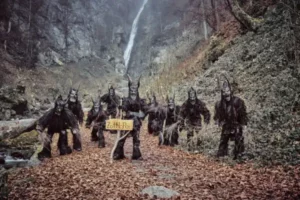Krampus customs in Salzburger Land
Between hand-carved masks, loud bells and furry costumes
The word “Krampus” comes from the Middle High German word “Krampen”, which means “something lifeless, dried up, withered or withered”.
The Krampus tradition is very important here in Salzburg. Every year from mid-November to the beginning of December, many Krampus passers-by get up to mischief at various spectacles. On the one hand, there are the classic house visits and on the other, Krampus runs.

On 5 and 6 December, St. Nicholas goes from house to house with his “Kramperl” and “Engerl” and traditionally gives the good children nuts, mandarins and something sweet. Of course, St Nicholas and the Krampus are very happy to receive poems, songs sung by the children or instrumental pieces.


At the Krampus runs throughout Salzburg, the Krampus passers-by present themselves with their scary wooden larvae, thick skins, loud bells and rods and tousle the children’s hair or wave their rods through the legs of the spectators. The Krampus and his angels give out sweets and nuts and are the highlight for the little ones.
But what is the background behind all this?
Basically, St Nicholas stands for good and Krampus for evil. This means that the Krampus praises and gives presents to the children who were good last year and the bad children are sent to the Krampus and “punished”. Meanwhile, this custom also has a lot to do with the carvers of the wooden masks. The carving of such a Krampus mask is an old craft that is becoming increasingly rare.
I myself have been an Engerl at Krampuspassen since I was 5 years old and after almost 15 years I still look forward to this “5th season” every year. The team spirit among the members, the joint preparations and the presentation of your own group is always a highlight. You can feel the enthusiasm and the fear and joy at the same time and there is a cheerful atmosphere at every Krampus run. Of course, everyone is also in a celebratory mood after each run and celebrates this old tradition together.
For all unsuspecting guests, this tradition often seems brutal and senseless at first glance, but when you understand the idea behind it and the loving treatment of the children, enthusiasm prevails.

